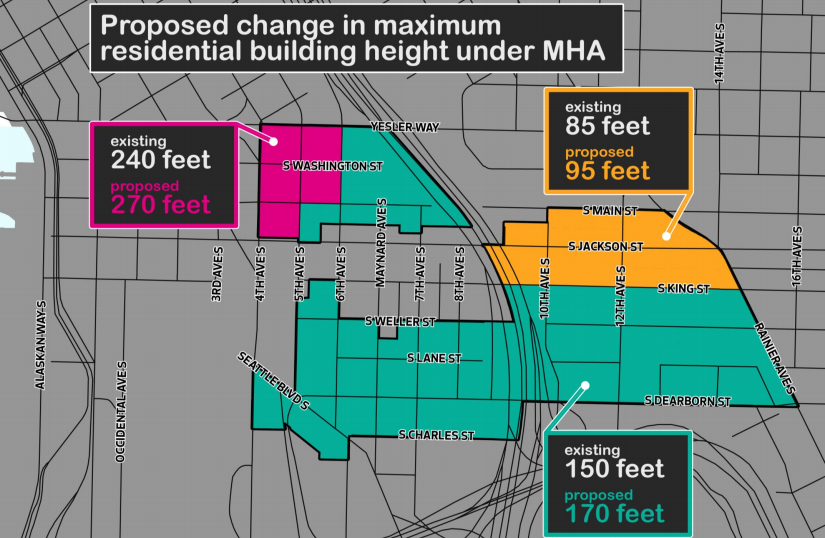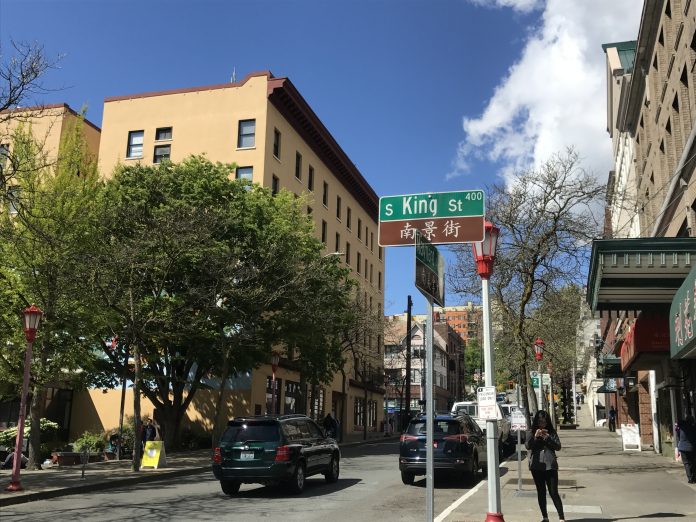The area of Chinatown-International District is already zoned for tall buildings, but a new neighborhood zoning proposal could push building heights higher and allow wider buildings. The proposal pairs mandatory requirements for affordable housing with the zoning changes. Developers would generally be expected to set aside 5% to 7% of their developments aside for affordable housing or pay a fee to City for affordable housing. Incentive zoning requirements would also be retained, such as contributions to Green Street improvements, preservation of open space and historic landmarks, development of privately-owned public spaces (e.g., public open space, public atriums, human services uses, and public restrooms), and developing affordable housing.

The rezone proposal passed out of committee in June as amended. A full vote on the proposal by the City Council is expected in August. Tonight, however, a public hearing on the proposal will be held to get more feedback from the public on priorities, some of which could be used to further amend the proposal when it goes to the full City Council. During the intervening weeks of the committee vote, Councilmembers have also been meeting with stakeholders and the public to find out what they want to see in the proposal that may not already be there and what already works.
At the public hearing tonight, the meeting will kick off with a presentation on the rezone proposal by City staff. Another presentation by InterIm CDA staff, Tom Im and Leslie Morishita, will follow. InterIm is the local community development authority responsible for funding and building affordable housing and doing specialized community planning. InterIm staff will talk about community-driven strategies that can minimize risk of economic, cultural, and commercial displacement. Other topics in their presentation will include ways to head off gentrification and create stability for long-term residents and businesses in the neighborhood.
The Chinatown-International District community has already identified a variety of neighborhood priorities to realize some of these goals. The Chinatown-International District 2020 Healthy Community Action Plan specifies nine key strategies to sustain the community. These include some of the following:
Strategy 3:
Prevent displacement and disruption of social, financial, educational, and health support networks. Advocate for policies and implement programs to increase the pace of affordable housing development, especially for very low-income residents and the working poor, to ensure that housing is available and affordable for all segments of the market.
Strategy 4:
Stabilize residential and commercial renters and owners through direct services. Reduce the risk and incidence of homelessness, eviction and disruption of social, financial, educational, and health support networks.
Strategy 6:
Enhance right-of-way to increase safety, social connections, and physical activity. Implement environmental design improvements, including street and sidewalk improvements that are healthful, biophilic and regenerative. Advocate for public investments to make the neighborhood safer, more connected, and accessible, especially for pedestrians and bicyclists.
Other community goals and strategies are embodied in the Vision 2030 Summary, which dates back to 2007.
The public hearing on the rezone proposal will begin at 5pm with public comment to start sometime after 5.30pm. The meeting will be held at Nisei Veterans Hall, which is located east of 12th Ave S on S King St (1212 South King Street) in Little Saigon.
Chinatown-International District Rezone May Get Committee Vote
Stephen is a professional urban planner in Puget Sound with a passion for sustainable, livable, and diverse cities. He is especially interested in how policies, regulations, and programs can promote positive outcomes for communities. With stints in great cities like Bellingham and Cork, Stephen currently lives in Seattle. He primarily covers land use and transportation issues and has been with The Urbanist since 2014.



